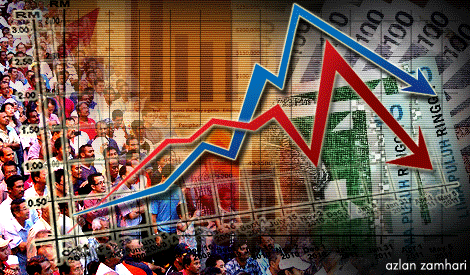COMMENT | Is Malaysia heading into a recession or another Great Depression?
COMMENT | The rapid spread of the Covid-19 pandemic has caused economic activities to come to a halt while bringing the world into disarray.
The healthcare system in some countries is being stretched thin to cope with the exponential rise of daily infections.
The closure of businesses has caused the economy to decline significantly and the threat of recession appears to be certain.
Technically, it is too early to call the current economic downturn a recession, since recession is generally defined by a period of economic decline in two successive quarters.
Recession is fairly common and considered as part of a healthy economic cycle while economic depression on the other hand, is far more uncommon.
Depression is far more devastating than a recession and the period of economic decline may last for years.
The latest economic depression in global history was the Great Depression that occurred from the late 1920s to the early 1930s, in which the GDP of the US fell by 50 percent and unemployment soared to 25 percent.
While likening the current economic downturn to the Great Depression may seem far-fetched at the moment, the reoccurrence of another Great Depression may not be entirely impossible.
Just three weeks ago, US oil prices have plummeted to a negative value for the first time in history due to the dramatic shrink in global demand for oil and the expiry of futures contract, along with oversupply that causes oil storage space to run low.
In addition, the global nature of the pandemic means that global demand is stunted.
Is Malaysia spared?
Covid-19 has forced Malaysia into a movement control order (MCO) which has lasted for almost two months until May 12.
Most non-essential businesses are not allowed to operate resulting in a large section of the workforce being laid off or furloughed.
The decline in Brent oil prices to below US$20 per barrel is also a huge blow for Malaysia, especially considering that Budget 2020 was based on oil prices being US$62 per barrel.
In addition, Malaysia is currently facing political uncertainty due to a recent government change, which ultimately slowed down Malaysia’s response in dealing with this pandemic.
Malaysia has decided to re-open almost all of its economic activities on May 4 under a conditional MCO.
Many parties have voiced concerns over the lack of a soft-landing approach by the federal government in re-opening the economy, with some state governments outrightly refusing to comply with the conditional MCO.
Although this decision may appear hasty, it is understandable since Malaysia continues to lose RM2.4 billion every day while the MCO is in place.
To address the current economic decline, the government and central bank have announced expansionary policies by injecting more money into the economy and introducing various assistance to the people, which will help to cushion the economic shock.
A more comprehensive and generous stimulus package will be required to speed up the recovery of the economy post-MCO.
Temporary measures or amendments to the law have also been introduced to provide some relief.
One of the most significant amendments is the Companies (Exemption) (No. 2) Order 2020 which protects companies from being wound-up for a period of six months after receiving a statutory demand, compared to the previous period of 21 days.
Not wanting to be left behind, the judiciary had started conducting court hearings online, with the Court of Appeal streaming its hearings live for the first time on April 23.
This move has been welcomed by the legal fraternity and public alike as this will ensure better access to justice despite the MCO being in place.
The new normal
While there are a lot of uncertainties moving forward, one certain thing is the world as we know it, will be changed.
Many industries have discovered that technology enables them to operate remotely without being physically present in their office premises.
Government or judicial businesses are still being conducted effectively without physically being in the same place with the relevant officers.
The MCO had also accelerated the local economy’s transition into e-commerce, with more businesses relying on online sales as an alternative to physical store sales.
Social distancing measures are likely to continue to be implemented even after the MCO is lifted, and businesses will continue to learn how to operate while minimising human interaction.
The collapse of the global economy is unlike anything that has ever occurred in our lifetime.
Nobody knows how long this pandemic will last or when a vaccine could be discovered, making any future economic projections nothing more than educated guesswork.
How we manage and react to the pandemic will determine what happens in the future. Even if we are successful in defeating this pandemic, all of us must be prepared to adapt to the new normal.
LEONARD YEOH is a partner and NURUL QARIRAH is a legal associate with the legal firm, Tay and Partners.
The views expressed here are those of the author/contributor and do not necessarily represent the views of Malaysiakini.
RM12.50 / month
- Unlimited access to award-winning journalism
- Comment and share your opinions on all our articles
- Gift interesting stories to your friends
- Tax deductable
